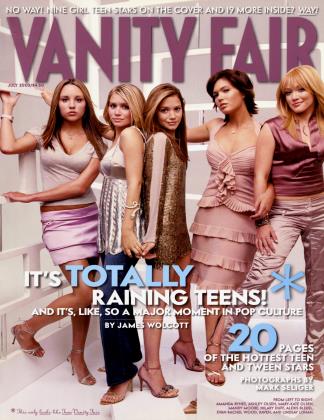Sign In to Your Account
Subscribers have complete access to the archive.
Sign In Not a Subscriber?Join NowMoneyman
EDITOR S LETTER
GRAYDON CARTER
During the past two decades, more money has probably passed through New York than through any other city in history. And yet, unfathomably, we're on the brink of financial crisis. One in 10 New Yorkers is out of work. Less than two years after September 11 we're closing fire stations and laying off support staff.
The city is letting go almost a thousand classroom aides, including two who were cited for heroism after helping students in wheelchairs escape from their school near the World Trade Center during the attack. Garbage collection is being cut back, as are city park-maintenance staffs and the crews that clean public toilet facilities. Hours at the city's magnificent cultural institutions, including the Metropolitan Museum of Art and the New York Public Library, may be curtailed.
Michael Bloomberg, who was elected mayor by the slimmest margin in the city's history, has taken it upon himself to fix the problem the way any businessman would: by reducing overhead and increasing revenue. The trouble is he's doing this largely on the backs of middleand working-class New Yorkers. He raised the sales tax and the local income tax. He also upped property taxes—by a breathtaking 18.5 percent. Police officers, who were threatened with severe cutbacks in the mayor's "doomsday budget," have seen their role change from one of protection to that of being just another part of the revenue stream. Like salesmen, they have their quotas to make. Silly, petty laws are being enforced in order to bring in more money. A deli owner on the East Side was fined $2,500 for having too many words on his awning. A man was ticketed for resting on a milk crate outside a Bronx barbershop.
This has not made the police popular. And it's not doing much for Bloomberg's reputation, either. The mayor's approval rating dropped from 48 percent in February to 32 percent in May. The same poll, conducted by a local college, included a more damning statistic, especially for a sociable city like New York: 40 percent of those surveyed said they wouldn't want to have dinner with the mayor. That really hurts. I have
broken bread with Michael Bloomberg, £ both before he was elected to office and = after. He is nothing if not affable, good company, and a terrific host. As long as you don't want to eat in a restaurant.
Here, Michael Bloomberg loses me— and a lot of others. With the enormous fi-
nancial and service problems the city feces, and with tourists staying away in droves because of terrorism and SARS (and wait until that garbage starts piling up in the heat of the summer), why does he squander valuable political currency by pushing a law banning smoking in all bars and restaurants? There are approximately 25,000 such establishments in the city, and they bring in more than $10 billion annually.
Most restaurateurs, even if they do well, barely get by. A recent survey of 50 random bars and restaurants by the New York Post found that business was down by half at some of them since the law went into effect in April. After making it impossible to eat and smoke inside, the mayor decided to do the same for outside, raising the price of outdoor-cafe licenses by 400 percent this year. Call 311, the city's non-emergency hot line, to complain about bar patrons keeping you awake till all horns of the morning because they're out on the sidewalk smoking, and your call gets logged into a computer and the police respond when they have time. Oh, and, unlike 911, the call will cost you.
Michael Bloomberg is clearly a good business executive—he made all that money, didn't he? But he's used to being a boss—you know, having people laugh at his jokes and getting to order them around. In just 19 months in office, he's done the unimaginable. He's made New York uncool. Michael Bloomberg should know that to succeed as mayor you've got to rule with your heart and your head. You need carrots as well as sticks; the gifts of conciliation and compromise, not just tenacity and blind conviction. And to be the mayor of the city of New rk, you've got to be just a bit bigger than life—both commanding and colorful. It really should be part of the job description. New York likes leaders, not hall monitors. You don't have to be Jimmy Walker, but you don't have to be Barney Fife either.
 View Full Issue
View Full Issue


















Subscribers have complete access to the archive.
Sign In Not a Subscriber?Join Now